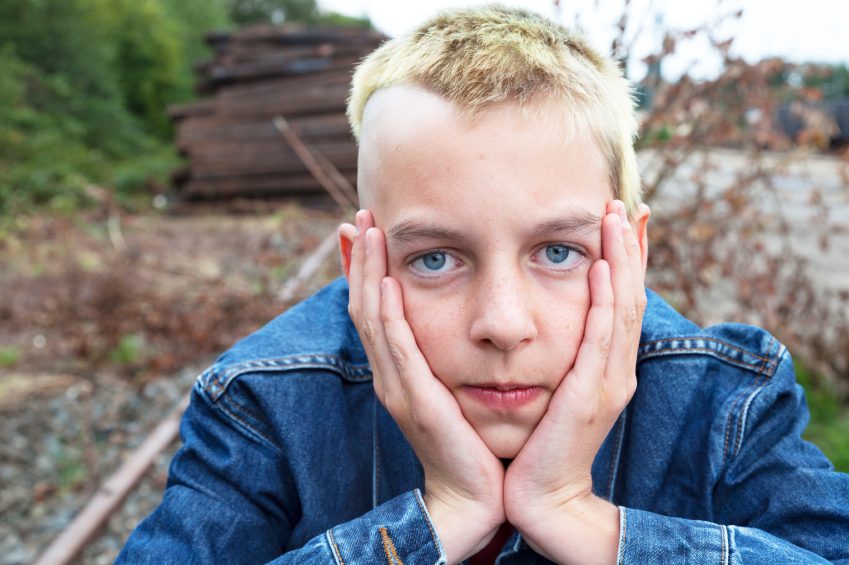Can My Teen Be My Confidant?
Posted in: Multimedia, Teenagers, Videos, You & Your Family
Topics: Child + Adolescent Development, Relationships
It’s awfully hard to figure out if your teenager is grown up. That’s largely because it’s awfully hard for your teen to decide. Is your high school junior old enough to know about family finances? Is your 15-year-old mature enough to understand difficulties that you’re having with your boss at work? These questions come up all the time as parents navigate the murky waters of emerging adulthood in their kids. Things get even more confusing if you take a look at what your kids are reading or watching on the screen. The storylines of young adult fiction are filled with teens taking on extraordinarily complex and adult-themed topics. All of the protagonists in the stuff your adolescent views on TV, reads in class, or (gasp) even reads for the heck of it, are grappling with…well, things like family finances and difficult bosses at work.
So, given that your kids are themselves dealing with these very issues, is there a problem with having your child himself be a trusted confidant, one who, after all, knows you as well as anyone? Maybe it’ll be a bonding experience. Maybe it’ll help your teen to better understand and empathize with your own stressors.
To a certain extent, this is perfectly reasonable. Consider the family that has to cut back on holiday presents because of economic pressures. Since times are rough financially, it would be good for the whole family to discuss what this means for everyone in the long run, as well over the next few months. In this instance, you’ll need to adjust what you say to meet the developmental standards of each child. You’ll tell your 10-year-old that “things are a bit tighter this year,” and you’ll tell your 17-year-old, “I had to take a pay cut because jobs at the plant are being scaled back, and this was the only way I could continue to bring home a paycheck.”
But in both cases, and this may take some work, you need to remember first and foremost that you are the parent. I know this sounds preachy and maybe even patronizing, and that is certainly not the intention of this post. But we’re all human. It’s during times of high stress, during episodes when you might value a confidant who knows you well, that you will most likely be tempted to forget the primary role you play as a parent. And that role is, in fact, even more important in those stressful times.
Think of it this way. Your teen needs his or her own identity. That’s exactly the developmental goal on which he or she is most focused. He or she has personal worries and concerns that are every bit as potent in a teen’s unique cultural milieu. Making the school play, earning at least a C on that math test, getting a text message back from a friend…these are all equal in your teen’s mind to things like arguments with your boss at work. And, moreover, you want to relish and invite those rare moments when your teen feels compelled to seek your advice on these matters.
If you lead by sharing your own worries from your uniquely adult world, your teen may worry that her concerns pale in comparison. And you don’t want to lose the chance to chat with your kid when your kid has something to chat about. Those are the moments you want to cherish and encourage, and lots of teens will tell you that when you yourself seem overwhelmed, they feel less inclined to let you know about their own concerns. Why burden you more, they think.
That doesn’t mean you don’t talk. Please don’t misunderstand the intention of this post. This means, instead, that you keep in mind that your child may wish to use you as a confidant, but the converse of that arrangement does not necessarily hold. The reciprocity inherent in age-matched friends who meet to vent over a cup of coffee or a beer…that can’t be the relationship you have with your teen precisely because you want, by definition, for the relationship with your teen to be one-sided. You are the concerned and sage listener to your teen, not the other way around.
One more thing. You are also, no matter how mature your teen happens to be, the enforcer. Your teen needs to know that you will not be pleased with certain behaviors. Coming home without calling, driving while intoxicated, skipping class with friends—these are all examples of behaviors in which you specifically want your kid to picture your disapproving face as an inhibitor to further mischief. You wouldn’t expect that of your age-matched friend. You might tell your colleague at work that you’re worried about her drinking, but you aren’t going to ground her.
Finally, remember that your teen needs to USE you as the “out” when things get dicey in his own pressured world. For example, a bunch of kids leave a party and start to pile into a car where the driver is clearly intoxicated. In this scenario, let your teen know that he can say, with absolute impunity among his friends, “Dude, I can’t go for this ride. If my dad finds out, he’ll kill me.”
That kind of arrangement becomes harder and less believable if you and your child rest on equal footing.
This doesn’t mean you can’t be your child’s friend. It just means that the relationship between parent and child, and especially between parent and adolescent child, works best if it functions uni-directionally.
Use your friends, therefore, as confidants. Let your teen, in turn, use you.
This article originally aired as an ABC News segment on 11/02/2009.


 Share
Share Tweet
Tweet





